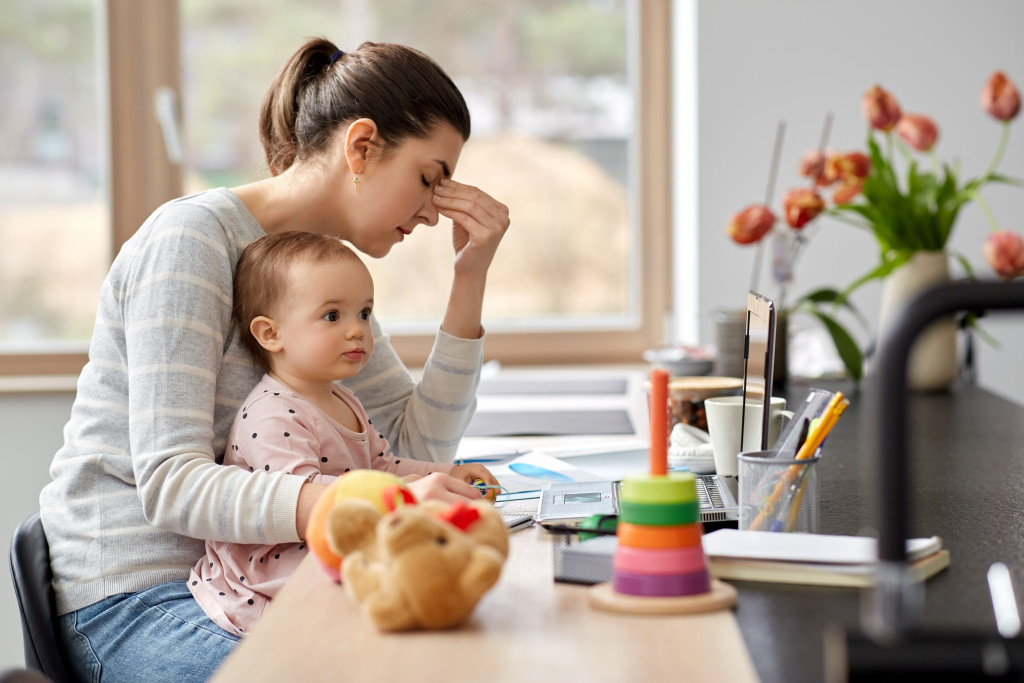Congratulations! You’ve just had a baby! As you get ready to take on the challenges of being a new parent, it’s important to remember that your body has gone through an amazing transformation. Here are some tips on how to care for yourself after giving birth.
Your body changes a lot during pregnancy – here’s what to expect
Pregnancy is an amazing time for a woman’s body. In just a few short months, it grows and changes to accommodate a new life. These changes have a myriad of effects on you as a person.
Physical changes
As your body grows another human being and prepares to take care of it, your body will go through changes. Some of the physical changes that occur during pregnancy are enlarged breasts and an expanding waistline. Your body expands to accommodate the growing fetus, and your hips shift as well. Your genitals will also get stretched out. Most mothers gain weight, too. After giving birth, some of these changes might stick around. You might also gain varicose veins and stretch marks.
Chemical changes
Because of pregnancy, you will experience hormonal imbalance. This can cause a variety of psychological difficulties, including mood swings, anxiety, loss of self-esteem, and depression. These may stick around until your hormones normalize after pregnancy. However, it is best that you prepare for the worst. A lot of mothers experience post partum depression. The hormonal imbalance can be further worsened by the realization of how everything changes when you have a baby. Even your body’s immediate physical changes can affect your emotional state, too.
Treating the Aftermath
Thanks to advances in medicine and information technology, there are now lots of options for tackling the physical and chemical issues that arise after pregnancy. Let’s discuss some of them:

Dealing with Your Emotions
Mood swings and postpartum depression are two common emotional side effects of pregnancy. Many women experience them, and they can be very difficult to deal with. However, there are ways to cope with them.
First, it is important to have a support system. This could be your partner, friends, or family. Talking to people who understand what you’re going through can be really helpful. They can also help take care of your child while you try to deal with your emotions, or at the very least, make the burden a bit lighter. It can also be helpful to find a support group for new mothers — this can give you access to other women who are going through the same thing as you. It helps to have women who know exactly what you are going through and are going through it right now. If you do not look for a support group, you may still find these women in your immediate family and friends, but you will likely not find anyone going through it at the same time as you are. You can even go on postpartum retreats with your baby, where people will help you in taking care of your baby and yourself.
Second, it is important to take care of yourself. This includes getting enough sleep, eating healthy food, and exercise. Taking care of yourself will help you feel better emotionally and physically. Exercise may also help you get you back in shape if it matters to you, but remember that you should not pressure yourself. At the very least, getting back in shape may also help you deal with the loss of self-esteem usually associated with losing your figure.
Finally, don’t be afraid to ask for help. If you’re feeling overwhelmed or like you can’t cope, don’t hesitate to reach out for help. There are always people who can help you get through this tough time.
Getting Your Body Back
Some of the weight gain and the expansion of the hips can be staved off by working out and staying active, but before doing this, you should consult your doctor. Working out to the limits may strain your body too hard. If you really want to exercise for the sake of your physical and mental well-being, try to find a postpartum coach. There are various products and treatments for varicose veins and stretch marks, too. Varicose vein treatments include sclerotherapy, laser treatment, and ambulatory phlebectomy, which may be expensive. Stretch marks are easier to deal with since you can use a topical cream like Palmer’s Cocoa Butter Massage Lotion. You can also massage stretch marks with aloe vera or coconut oil. Some mothers also get vaginal rejuvenation since giving birth can take its toll on your womanhood. For some women, this helps them regain a bit of their self-image.
However, getting your body back doesn’t just mean returning to your old figure. For many women, that may not happen, and that’s okay. Try to not feel pressured about it, and avoid comparing yourself with others. The changes that happened to your body are proof that you did something amazing — you gave life to someone new. Remember: tigers have stripes!
Conclusion
There are many different ways to deal with the emotional and physical changes that come with pregnancy. You should try to find a support group of women who are going through it at the same time, take care of yourself emotionally and physically, and don’t be afraid to ask for help if you need it. Additionally, there are many treatments available for postpartum issues like stretch marks, varicose veins, and vaginal rejuvenation. It is important to remember that every woman’s experience is different and that you should not compare yourself to others. You are an amazing mother simply because you brought new life into this world!